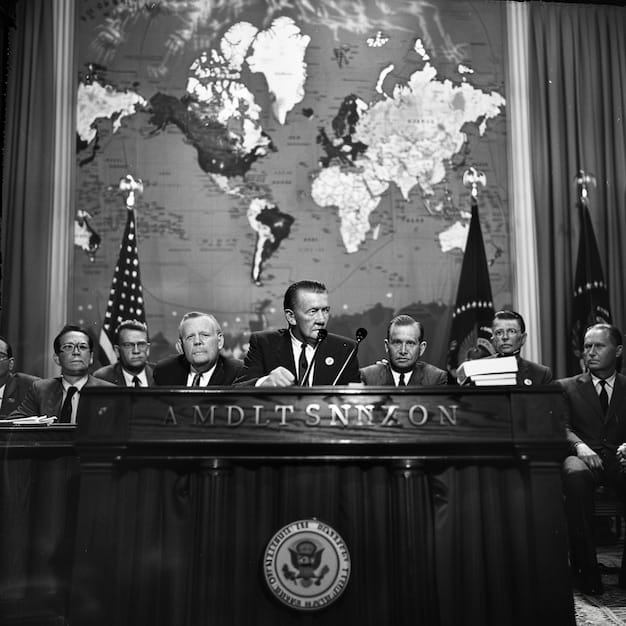The US and the UN: Impact of Potential Withdrawal from International Organizations

The United States’ potential withdrawal from key international organizations like the UN could significantly impact global diplomacy, security, and economic stability, affecting both US interests and the effectiveness of the UN itself.
The relationship between the United States and the United Nations has been complex and crucial for decades. This article examines the potential impact of the US and the UN: Examining the Impact of a Potential Withdrawal from Key International Organizations, considering the historical context, potential consequences, and alternative approaches to maintain a productive partnership.
The Historical Partnership Between the US and the UN
The United States has been a key player in the United Nations since its inception. Understanding this historical partnership is vital to grasping the potential ramifications of any significant shift in its involvement.
The Founding of the UN and US Involvement
The US played a crucial role in establishing the UN after World War II, envisioning it as a platform for international cooperation and conflict resolution. This vision was deeply rooted in the lessons learned from the failures of the League of Nations.
Key Moments of US-UN Cooperation and Discord
Throughout the decades, the US and the UN have collaborated on various global issues, from peacekeeping missions to humanitarian aid. However, differences in opinion and policy have also led to tensions and disagreements.
- The Korean War: The US led a UN-backed coalition to defend South Korea, showcasing early cooperation.
- The Cold War: The US and Soviet Union often clashed within the UN Security Council, leading to vetoes and stalemates.
- The Iraq War: The US-led invasion of Iraq in 2003 without explicit UN authorization strained the relationship.
The US-UN relationship has been marked by both periods of strong collaboration and moments of significant tension. Understanding these dynamics is essential when considering the implications of a potential US withdrawal from key international organizations.

Reasons for Considering a US Withdrawal
Several factors could contribute to the idea of the United States withdrawing from key international organizations. These reasons often stem from political ideologies, economic concerns, or perceived inefficiencies within the organizations themselves.
Political Ideologies and National Sovereignty
Some political factions argue that US involvement in international organizations infringes upon national sovereignty. They advocate for a more isolationist approach, prioritizing domestic interests over global collaboration.
Economic Burdens and Financial Contributions
The US is one of the largest financial contributors to the UN and other international bodies. Concerns about the allocation and effectiveness of these funds often fuel calls for reduced financial commitments or outright withdrawal.
Perceived Inefficiencies and Biases
Critics argue that certain UN bodies are inefficient, bureaucratic, or biased against US interests. These concerns often lead to demands for reform or, in some cases, withdrawal as a form of protest.
These reasons reflect a complex interplay of political, economic, and ideological factors that influence the ongoing debate about the United States’ role in international organizations.
Potential Impacts on Global Security and Diplomacy
A US withdrawal could have far-reaching consequences for global security and diplomacy. The absence of US leadership and resources could significantly alter the international landscape.
Reduced US Influence and Leadership
The US wields considerable influence within the UN and other international organizations. A withdrawal would likely diminish its ability to shape global policies and address critical security challenges.
Weakened International Peacekeeping Efforts
The UN relies heavily on US financial and logistical support for peacekeeping operations. A reduction in this support could undermine peacekeeping efforts and exacerbate conflicts around the world.
Increased Global Instability and Conflicts
Without US engagement, the UN’s ability to mediate conflicts and enforce international norms could be compromised. This could lead to increased instability and a greater likelihood of armed conflicts.
The potential consequences of a US withdrawal extend beyond political and economic considerations, impacting the very foundations of global security and diplomatic relations.
Economic Consequences of Reduced UN Engagement
Reduced engagement with the UN could have significant economic repercussions for the United States, affecting trade, investment, and global financial stability.

Impact on International Trade and Investment
The UN plays a crucial role in facilitating international trade and investment through its various agencies and programs. A US withdrawal could disrupt these mechanisms and create barriers to economic cooperation.
Effects on Global Financial Stability
The UN works to promote global financial stability through initiatives aimed at combating money laundering, tax evasion, and other illicit financial activities. A US withdrawal could weaken these efforts and increase financial risks.
Potential for Economic Sanctions and Trade Disputes
The US relies on the UN to enforce economic sanctions against countries that violate international norms. Without UN backing, the effectiveness of these sanctions could be diminished, potentially leading to trade disputes and economic instability.
These economic consequences highlight the interconnectedness of the global economy and the importance of international cooperation in maintaining stability and promoting prosperity.
Alternative Approaches to US-UN Relations
Rather than outright withdrawal, there are alternative approaches the US could pursue to address its concerns about the UN and ensure a more productive relationship.
Reforms within the UN System
The US could advocate for reforms within the UN to address issues of inefficiency, bias, and accountability. This could involve working with other member states to streamline operations, improve transparency, and ensure equitable representation.
Strategic Engagement and Negotiation
The US could adopt a more strategic approach to its engagement with the UN, focusing on areas where its interests align with those of the organization. This could involve negotiating specific agreements and partnerships to achieve common goals.
Bilateral and Multilateral Partnerships
In addition to working through the UN, the US could strengthen its bilateral and multilateral partnerships with other countries and organizations. This could provide alternative channels for addressing global challenges and promoting international cooperation.
These alternative approaches offer ways for the US to address its concerns about the UN while maintaining its commitment to international cooperation and global leadership.
Case Studies: Impact of Withdrawing from International Agreements
Examining the impact of past US withdrawals from international agreements can provide valuable insights into the potential consequences of a similar decision regarding the UN.
The Paris Agreement on Climate Change
The US withdrawal from the Paris Agreement on climate change was met with widespread criticism and raised concerns about the country’s commitment to addressing global environmental challenges.
The Iran Nuclear Deal (JCPOA)
The US withdrawal from the Iran Nuclear Deal led to increased tensions in the Middle East and raised questions about the effectiveness of international non-proliferation efforts.
The World Health Organization (WHO)
The US decision to withdraw from the World Health Organization during the COVID-19 pandemic drew criticism for undermining global health security and cooperation.
These case studies demonstrate that withdrawing from international agreements can have significant political, economic, and social consequences, both for the US and for the world.
| Key Point | Brief Description |
|---|---|
| 🇺🇸 US-UN History | Cooperation mixed with discord shaped the US-UN relationship. |
| 🌍 Global Security | US withdrawal could weaken peacekeeping and increase instability. |
| 💰 Economic Impact | Reduced UN engagement may harm trade and financial stability. |
| 🤝 Alternative Approaches | Reforms and strategic engagement can improve US-UN relations. |
FAQ
▼
Some factions believe the UN infringes on US sovereignty, is economically burdensome, and exhibits biases against US interests. These concerns fuel the idea of withdrawal.
▼
A US withdrawal could diminish its global influence, weaken international peacekeeping efforts, and potentially increase global instability and conflicts.
▼
It could disrupt international trade and investment, destabilize global finances, and undermine the enforcement of economic sanctions, leading to trade disputes.
▼
The US could push for UN reforms, strategically engage in negotiations, and strengthen bilateral and multilateral partnerships to address concerns.
▼
Withdrawals from agreements like the Paris Accord and the Iran Nuclear Deal had political, economic, and social repercussions, highlighting potential challenges.
Conclusion
The decision of whether the US should withdraw from key international organizations is complex, fraught with potential consequences that affect not only the US but the entire world. While there are valid concerns regarding the UN’s efficiency and perceived biases, a complete withdrawal could undermine global security, diplomacy, and economic stability. Alternative approaches, such as advocating for reforms and engaging in strategic negotiations, offer a more constructive path forward, allowing the US to address its concerns while maintaining its commitment to international cooperation and global leadership.





